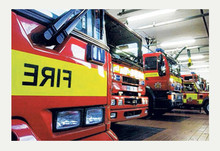THE growing problem of fires being caused by lithium-ion batteries has become an “emerging risk” in this region, a fire chief has warned.
The number of fires directly linked to lithium-ion batteries that firefighters have to attend has increased significantly in recent years across the UK.
These batteries are used to power electric vehicles such as bikes, scooters and cars, but they’re also found in disposable vapes which are often discarded haphazardly.
Chris Ross, Stewartry Area Station Commander, was quizzed on the issue at last week’s Stewartry Area Committee.
Castle Douglas and Crocketford Councillor John Young said: “One of the big news items nationally is fires caused by lithium-ion batteries.
“Have there been any fires caused by these batteries bursting into flames in this region?”
Mr Ross replied: “There haven’t been any major or significant incidents with lithium-ion batteries that I’m aware of, however there’s been one or two smaller incidents that I’m aware of.
“There have certainly been one or two where I’ve been in attendance.
“It is an emerging risk. The services is actively trying to gather as much information and sort out a strategy for how we deal with these risks.
“We regularly carry out visits to sites, or we’re aware of sites, where there is battery storage sites that are starting to receive planning permission.
“We do undergo regular training on how to manage these kinds of incidents, but I understand your concerns.
“They are certainly concerns of mine too. It is an emerging risk and we gather intelligence by unfortunately attending incidents and how we manage them.”
Last summer, Dumfries and Galloway Council agreed to call for a ban on disposable vapes in Scotland on safety and environmental grounds.
Meanwhile, in November last year it was revealed that the increased fire risk caused by these lithium-ion batteries had hit Dumfries and Galloway Council heavily in the pocket.
The lithium-ion batteries in these small smoking devices pose an increased fire risk and there have been reports of blazes caused by them at town dumps in the UK.
As a result, insurance companies massively hiked up the costs for providing cover to waste facilities.
The annual insurance costs for Dumfries and Galloway Council’s Lochar Moss waste mechanical biological treatment (MBT) facility skyrocketed from £468,000 to £896,000 this year.
And the excess payment, if Dumfries and Galloway Council was to make a claim, is a further £100,000.























